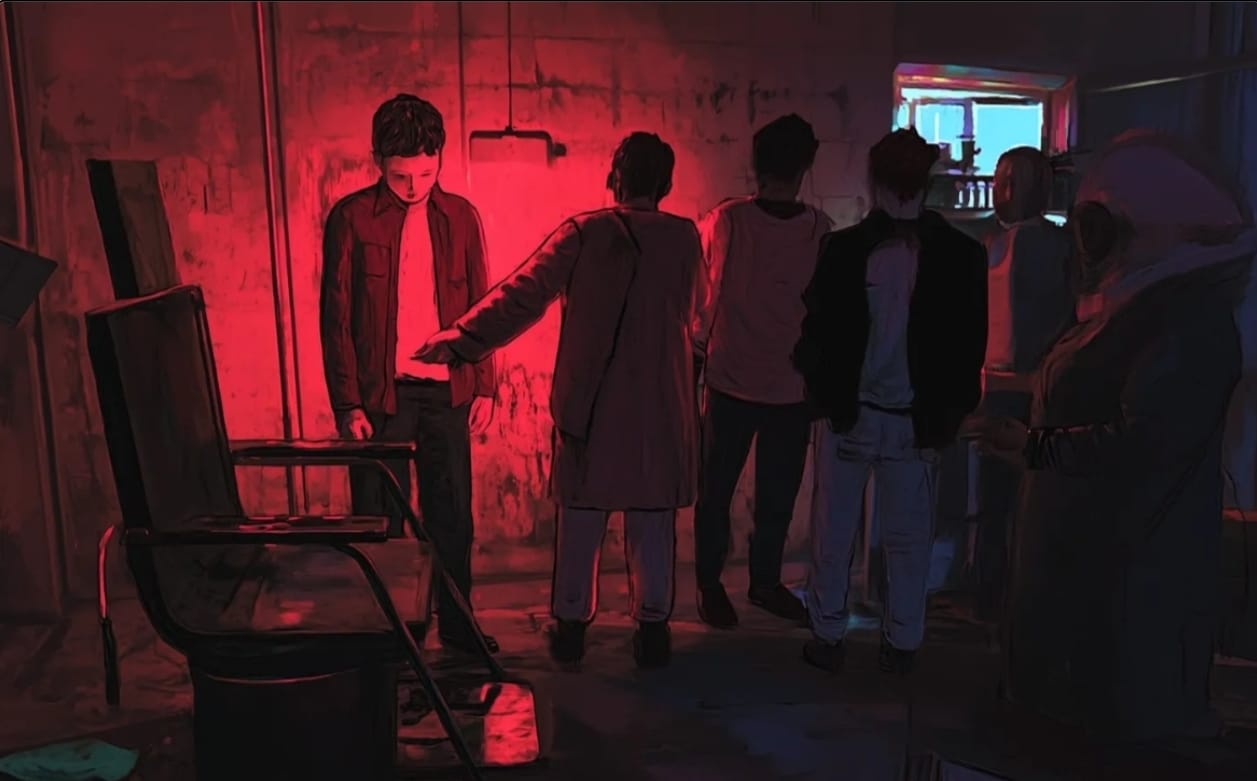In the complex and often murky realm of state power and national security in Bangladesh, few events have carried the same seismic impact as the recent visit by the chief adviser to the secret detention centers—infamously known as Aynaghar. This dramatic inspection has laid bare an underbelly of repression that, until now, existed in whispered rumors and covert reports. The revelation of these hidden prisons, where dissent was met with brutal tactics designed to shatter opposition, is not merely a disclosure of past misdeeds; it is a clarion call to reexamine and reconstruct the nation’s approach to governance, justice, and accountability. In the wake of this visit, Bangladesh is forced to confront a legacy of state-sanctioned terror—a legacy that, if left unchallenged, threatens the very foundation of a democratic society.
The revelations have taken on even greater significance in light of persistent allegations that Sheikh Hasina’s government has, at various times, utilized such detention centers to silence critics and imprison dissenters. Under Hasina’s leadership, state institutions have often been mobilized as instruments of political suppression, ensuring that voices of opposition—from political opponents to activists and journalists—are systematically muted. This exposes not only a dark chapter in Bangladesh’s history but also casts light on more recent practices where state power has been employed to maintain a tight grip on authority. Detailed analyses of political repression and human rights concerns in the region underscore how such tactics can undermine the very fabric of democratic governance.
Unveiling the Machinery of Repression
For decades, the existence of secret detention centers like Aynaghar has been cloaked in silence, operating in the shadows of Dhaka in areas such as Agargaon, Kachukhet, and Uttara. These facilities, shrouded in secrecy and denial, have been used to detain those deemed a threat to the regime. Eyewitness accounts and testimonies from former detainees describe cells so cramped they resemble animal cages, where conditions strip away basic human dignity and inflict both psychological and physical torment. The accounts of "absolute brutality" encountered during the visit echo past investigations and leaked testimonies that reveal the inhumane conditions within these cells.
In some cases, the methods employed in these secret prisons have been chillingly systematic. Reports indicate that detainees were subjected to long periods of isolation, sensory deprivation, and relentless interrogation techniques designed to break their will. This treatment, often documented by international human rights organizations, serves as a grim reminder of how state power can be twisted into a tool of repression. Researchers studying historical and contemporary instances of torture note that such practices are frequently used to silence dissent and ensure conformity within politically volatile environments.
Increasingly, evidence suggests that the use of such secret prisons was not confined to bygone eras. Recent investigations indicate that during Sheikh Hasina’s tenure, state security apparatuses—including agencies like the DGFI and National Intelligence Agency—were deployed to detain dissenters on trumped-up charges. This strategy allowed the government to neutralize opposition without the scrutiny that accompanies formal legal proceedings. The normalization of these practices has gradually eroded the very foundations of democratic institutions.
Such practices not only silence critics but also undermine the principles of freedom of expression and civil liberties, vital components of a healthy democracy. The transformation of these secret detention centers into tools of political control reflects a broader trend where state power is increasingly used to stifle opposition and maintain centralized authority.
Historical parallels drawn with other nations that have employed similar methods serve as stark warnings. Scholars point to examples from various parts of the world where the absence of effective oversight led to widespread abuses of power, resulting in long-term damage to the political and social fabric. Such comparisons underline the urgent need for reform and accountability in Bangladesh, where the misuse of detention facilities has left deep scars on public trust and the collective psyche.
Demanding Accountability and Sweeping Reform
The exposure of Aynaghar has galvanized calls for systemic reform—a push to overhaul the institutional structures that enabled such abuses to flourish. The legacy of these secret detention centers is symptomatic of deeper issues within Bangladesh’s governance framework. At the core of these issues is the misuse of power by security and intelligence agencies that have long operated with minimal oversight. This has led to urgent demands for independent oversight and comprehensive reforms to ensure that these institutions are held accountable.
One of the primary recommendations put forward by reform advocates is the modernization of outdated legal frameworks—many of which are relics of colonial-era legislation. These laws have, over time, become ill-suited to address modern human rights challenges, and their persistence has allowed for a culture of impunity. Reforms in the judiciary and law enforcement sectors are equally critical. Overhauling these systems includes establishing independent commissions to investigate abuses, enhancing training for police forces to prioritize ethical conduct, and ensuring that mechanisms for legal redress are accessible to all citizens. By modernizing these systems, Bangladesh could set a precedent for upholding the rule of law even in times of political turbulence.
Furthermore, there is a strong call for providing justice and reparations to the victims of state repression. The human cost of these practices is incalculable—a toll borne by individuals and society alike. Survivors, many of whom have endured years of torture, must be given platforms to share their stories, and their suffering must inform the reform process. Establishing comprehensive truth commissions and restorative initiatives is seen as a vital step toward healing old wounds. These mechanisms not only help in documenting past abuses but also serve as foundations for building lasting trust between the state and its citizens. Such efforts are essential for ensuring that state institutions evolve into entities that truly serve the public interest rather than merely perpetuating cycles of repression.
The push for reform extends beyond legal and institutional changes. It demands a reevaluation of the entire system of governance, emphasizing decentralization, transparency, and participatory processes. By promoting participatory governance and encouraging active civic engagement, the state can work to rebuild trust and foster a more inclusive political environment. In this context, the transformation of secret detention centers like Aynaghar into symbols of accountability is critical. It signifies a collective decision to confront the abuses of the past and build a future where no one is left voiceless or oppressed.
Reforms should also address the broader implications of unchecked state power. The use of detention centers to silence dissent under Sheikh Hasina’s government has not only damaged the nation’s human rights record but also created a culture of fear and mistrust. For Bangladesh to progress, it must break free from the legacy of secret repression and establish systems that promote open dialogue, political pluralism, and the protection of individual rights. Efforts to reform must therefore be comprehensive, spanning legal, institutional, and cultural domains.
Building a Future on a Foundation of Justice
As Bangladesh grapples with the dark legacy of secret detention centers and the systemic issues that have allowed state repression to persist, a new social and political contract is imperative—one that prioritizes accountability, transparency, and respect for human dignity. This transformative vision calls for a holistic reimagining of the relationship between the state and its citizens, rooted in the principles of restorative justice and transitional justice.
In practical terms, building a new Bangladesh involves establishing mechanisms that ensure the voices of victims are not only heard but are integral to driving future reforms. Comprehensive truth and reconciliation commissions can document past abuses and recommend concrete measures for reparation, serving as a foundation for rebuilding trust between the state and its citizens. These commissions must be supported by robust legal frameworks that ensure accountability for those responsible for perpetuating state-sanctioned violence.
Transforming the security and intelligence sectors is equally critical; these institutions must be reoriented to protect national security while upholding democratic values, free from political interference. This transformation calls for sweeping legal reforms, a significant change in institutional culture, and the implementation of strict oversight mechanisms.
Training programs that emphasize ethical conduct and respect for human rights, along with clearly defined operational mandates, are essential steps toward ensuring that these agencies operate transparently and are held accountable for their actions.
Beyond the institutional reforms, the broader socio-political environment in Bangladesh must evolve to support sustainable change. A vibrant civil society and an independent media are indispensable in this process. Active civic engagement by citizens can serve as a watchdog over state power, ensuring that the reformed institutions remain accountable. Over time, as democratic practices strengthen, the legacy of secret detention centers like Aynaghar could transform from a symbol of unchecked repression to a powerful reminder of the need for perpetual vigilance in safeguarding human rights.
Cultural narratives also play a role in shaping public perceptions about power and accountability. Television series like House of Cards and The West Wing offer dramatic depictions of the interplay between political ambition and the struggle for accountability, while films such as The Shawshank Redemption and Braveheart highlight the enduring resilience of the human spirit in the face of oppression. These stories resonate with the struggles faced by Bangladesh, reinforcing the idea that transformation, though arduous, is possible with determination and collective will.
The chief adviser’s visit to the secret detention centers is more than a symbolic act; it is a clarion call to confront the abuses of the past and to set a course for meaningful change. The practices of silencing critics and imprisoning dissenters—methods that have undermined public trust and destabilized the democratic process—must be eradicated. The journey ahead is undeniably challenging, but it is also an opportunity for Bangladesh to rebuild its institutions and reestablish its commitment to justice, transparency, and accountability.
In the end, the future of Bangladesh depends on the collective determination of its citizens and leaders to embrace reform wholeheartedly. By dismantling the mechanisms of repression and establishing systems that prioritize human dignity and the rule of law, Bangladesh can emerge from its dark past and build a more inclusive, democratic society. The transformation from a culture of secret repression to one characterized by open dialogue and respect for individual rights is essential for the nation’s long-term progress.
The path toward a reformed society is fraught with challenges, but it is a journey that must be undertaken. Through comprehensive legal reforms, institutional overhauls, and a robust commitment to participatory governance, the scars of secret detention centers like Aynaghar can eventually serve as catalysts for a future defined by accountability rather than fear.
As the nation moves forward, the lessons learned from past abuses will guide the development of a state where power is exercised responsibly, and every citizen’s rights are upheld.
Ultimately, the chief adviser’s visit is a powerful reminder that the struggle for justice is ongoing. It is a call for the people of Bangladesh to stand together, challenge the remnants of past repression, and create a legacy of transparency and democratic renewal. With unwavering commitment and collective resolve, Bangladesh can chart a course toward a future where the dark shadows of secret detention centers are replaced by the light of accountability and progress—a future where power is truly in service of justice, human rights, and the dignity of every individual.









